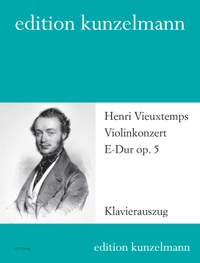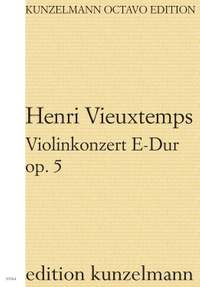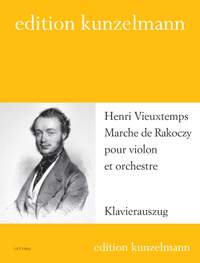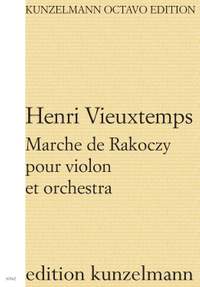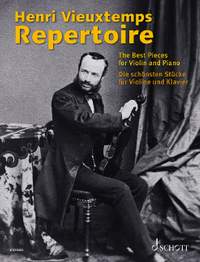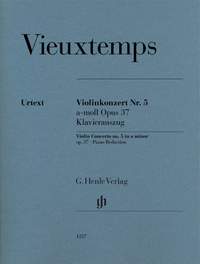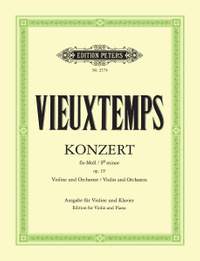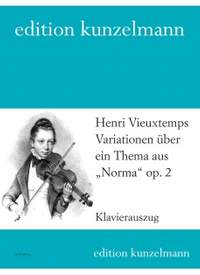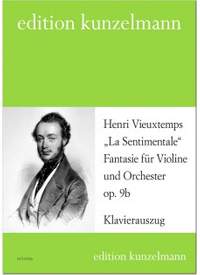Recommended Sheet Music,
New Publications by Henri Vieuxtemps
 Henri François Joseph Vieuxtemps was a Belgian composer and one of the most important violin virtuosos of the nineteenth century. As well as being a composer and performer, he was also a distinguished teacher; from 1864 he taught at the Paris Conservatoire, and from 1871 at the Brussels Conservatoire, where he tutored the acclaimed violinist Eugène Ysaÿe. Vieuxtemps was an important figure within the Franco-Belgian violin school during the mid-19th century and he played a key role in the development of the concerto form; in total he composed ten violin, and two cello concertos. Thanks to Edition Kunzelmann, two of Vieuxtemps' previously unavailable works, Violin Concerto in E major, Op. 5 and Rákóczi March in A minor, are available in their first ever printing. A full score, and a piano reduction option are available for both pieces, with additional performance material also available to hire from the publisher.
Henri François Joseph Vieuxtemps was a Belgian composer and one of the most important violin virtuosos of the nineteenth century. As well as being a composer and performer, he was also a distinguished teacher; from 1864 he taught at the Paris Conservatoire, and from 1871 at the Brussels Conservatoire, where he tutored the acclaimed violinist Eugène Ysaÿe. Vieuxtemps was an important figure within the Franco-Belgian violin school during the mid-19th century and he played a key role in the development of the concerto form; in total he composed ten violin, and two cello concertos. Thanks to Edition Kunzelmann, two of Vieuxtemps' previously unavailable works, Violin Concerto in E major, Op. 5 and Rákóczi March in A minor, are available in their first ever printing. A full score, and a piano reduction option are available for both pieces, with additional performance material also available to hire from the publisher.
You can find out more about these works below, or browse all of our Henri Vieuxtemps publications here.
Violin Concerto in E major, Op. 5
At the age of fifteen, and several years before his other, more recognisable violin concertos, Henri Vieuxtemps wrote the Violin Concerto in E major, Op. 5. Although it is his first violin concerto, this ingenious work already reveals some of the special qualities that are characteristic of his later major compositions. The concerto consists of three movements; the third movement, Rondo, is particularly well suited as a stand-alone piece. A technically very demanding and varied work, this concerto is perfect for showcasing violin virtuosity.
Piano reduction of the so far unpublished violin concerto in E major.
Available Format: Sheet Music
Full score of the so far unpublished violin concerto in E major.
Available Format: Sheet Music
Rákóczi March in A minor
In the nineteenth century the Rákóczi March was a strong symbol for the Hungarian struggle for independence from the Austrian monarchy, commemorating the uprising of Franz II Rákóczi against Habsburg rule. Based on a song traced back to the mid seventeenth century, it was long considered an unofficial national anthem of Hungary.
Vieuxtemps' version of the march predates that of Berlioz's (which became part of the iconic Le Damnation de Faust) from 1846. Vieuxtemps wrote his interpreation in 1843, and he immediately premiered it in Pest with great success. However, the concerts ended in a scandal, and as a result the composer avoided the city for twenty-three years and remained in the family archives unprinted.
The piano reduction, edited by Olaf Adler, incorporates the influence of Ferenc Erkel, as no piano reduction by Vieuxtemps himself exists. As the orchestra is intended to play such a strong role in the piece, the piano version should be understood as a lively work of chamber music, and not like a typical virtuoso concerto.
This work, published here in its first printing, is a bravura chamber music work in the version with piano.
Available Format: Sheet Music
This work, published here in its first printing, is an effective encore piece in the version with orchestra.
Available Format: Sheet Music
More Recent & Bestselling Violin Sheet Music by Henri Vieuxtemps
This volume contains well-known works and rarities from Vieuxtemps' concert repertoire, including the Romances, Op. 7, Souvenir d'Amérique, Op. 17 (variations on the famous melody Yankee doodle) and the much-performed work Ballade et Polonaise, Op. 38.
Available Format: Sheet Music
Amongst Vieuxtemps’ violin concertos, op. 37 is doubtlessly the best known and most popular by far. It owes its popularity not only to the brilliant violin part but also to the unusual form of the three movements that merge into one another without interruption. The violinist and musicologist Ray Iwazumi is not only the editor of this edition but also undertook the bowings for the solo part. The preface was penned by the Belgian expert on Vieuxtemps, Marie Cornaz.
Available Format: Sheet Music
Henri Vieuxtemps' Concerto No. 2 in F-sharp minor, Op.19 for violin and orchestra. Edition for violin and piano reduction.
Available Format: Sheet Music
Vieuxtemps wrote the variations on a theme from Bellini's Norma as a youngster for his concert tour in 1834. They are a thrilling concert piece and can be used in the training of young violinists to develop a controlled, cantabile violin technique.
Available Format: Sheet Music
Henri Vieuxtemps composed the fantasia La Sentimentale in readiness for his second tour of Russia in 1839-1840. In terms of its character, the fantasia is marked by bel canto opera. Vieuxtemps himself performed it many times until at least 1843, among others under the direction of the young Richard Wagner.
Available Format: Sheet Music


